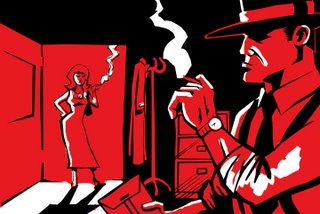Harry Dade Goes Mobile

Harry Dade knew what was what. And the minute the broad walked through the door, he knew she was nothing but trouble.
"Mr. Dade?" she’d breathed in her sultry Southern accent.
"That's right," Harry replied.
He stood to light her cigarette, wishing he'd taken the time to get rid of his five o'clock shadow. But the can of shaving cream he'd bought at O' Reilly's Market with his 7 a.m. doughnut and coffee still stood unopened, ignored on the rusty sink top.
It had been a quiet day at Dade Investigations. Outside on Sunrise Boulevard, traffic moved and drivers cursed through the evening smog. But till now, the only thing moving at Dade Investigations had been the smoke from Harry’s La Gloria Cubana cigar, wafting up to the dingy ceiling.
"Mr. Dade, I hear you solve problems," the blonde told him as she sat in the empty swivel chair.
Somehow, something seemed wrong with this picture—the swivel chair, its ripped fake-leather cover and exploding yellowed foam, the sexy blonde, her Versace purse, and 14kt gold diamond tennis bracelet catching the light.
"Depends what the problem is." Harry tried to focus on what she was saying, but the minute the broad crossed her legs, the tight red dress started inching up over her knees, exposing thigh through see-through stockings.
****
The blonde took a long drag on her cigarette, leaving a red ring of lipstick around the tip. "This is the problem," she said, pulling a mobilmedia cellphone out of her handbag. Clearly agitated, she pushed a few buttons and the screen came to life.
"Hi, baby," an athletic-looking young-man said.
Harry figured by the fire escape diagram on the wall behind him that he was sitting in a hotel room-–upscale, yes, but hotel room nonetheless.
"I'm making a lot of great contacts here at the conference, this place is just a nest of opportunity. I know it's our anniversary, but business has to come first if you want me to keep you in that life of luxury." The man laughed, as if at an inside joke. "I'm sorry baby, but it doesn't look like I'll be back in town till Saturday. You know I love you."
"Hmmph," the blonde said. She held the mobilmedia screen up to Harry's eyes and pointed aggressively. "You see that? You see that?"
Harry squinted, making out what appeared to be red women's lingerie, draped over the back of the man's chair, caught in a corner of the screen just above his shoulder.
****
Harry caught the 9:45 p.m. flight to Houston International.
He always traveled light, with just a couple changes of clothing stuffed into his beat-up teamsters union Local 924 blue-leather bowling bag.
That, and his surveillance equipment--a wireless mike and room bug, car tailing transmitter, and of course, his micro-mini wireless color pinhole camera with a built-in video transmitter.
After renting a beat-up Cadillac Seville at the airport, Harry checked into the Starlight Motel. He grabbed a quick pastrami on rye at a diner down the street and gulped down a black coffee while he fiddled with his equipment.
Though long ago, ten-years in an elite unit of the U.S. Special Forces had taught Harry that self-sufficiency was next to godliness. With little more than an afternoon of tinkering, he'd managed to interface his micro-mini wireless color pinhole camera with a newly purchased enhanced security product suite, enabling the viewing of encoded live video on his cellphone or PDA.
No more renting rooms while on stakeouts. From then on, Dade Investigations had conducted business in a mobile environment, both wireless and on wheels. Harry liked it better that way. Keep up with the times, or the times leave you behind.
****
Harry eased the Cadillac into park. A light drizzle tapped on the roof of the car, worming its way down the oily windshield.
Munching on a glazed doughnut, he focused his attention on the screen of the cellphone. The man from the blonde's video-greeting was clearly arguing with someone else, a note of desperation in his voice.
"Listen, Vinnie, do you really think I would do that? This is me, man, me..."
Things might get interesting after all, Harry thought, settling in for what from the looks of it, would be a long night.
****
As he reached for his Zippo, Harry heard the shot. That was when he knew things were starting to move...






